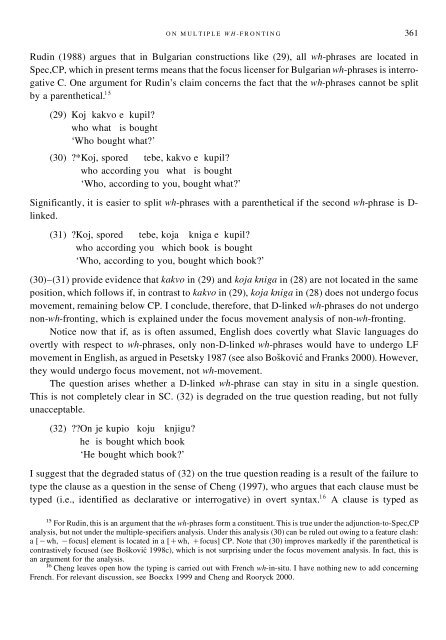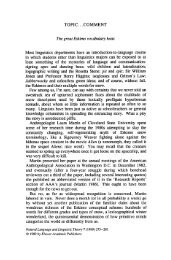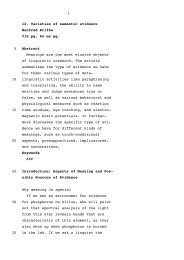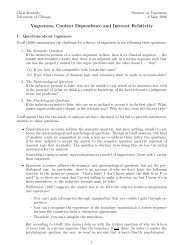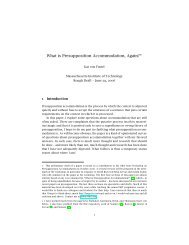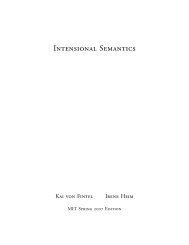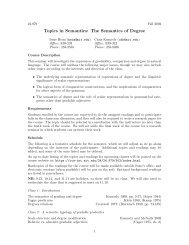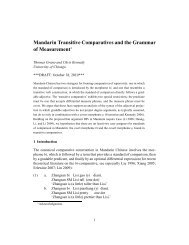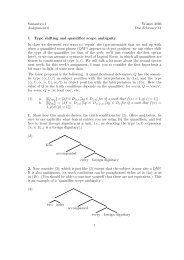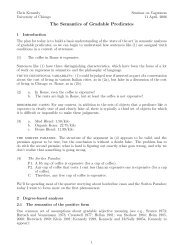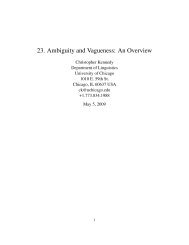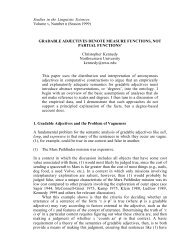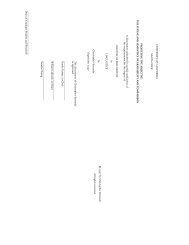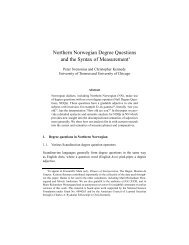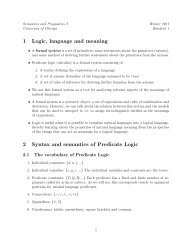On Multiple Wh-Fronting - University of Chicago
On Multiple Wh-Fronting - University of Chicago
On Multiple Wh-Fronting - University of Chicago
You also want an ePaper? Increase the reach of your titles
YUMPU automatically turns print PDFs into web optimized ePapers that Google loves.
O N M U L T I P L E W H - F R O N T I N G 361Rudin (1988) argues that in Bulgarian constructions like (29), all wh-phrases are located inSpec,CP, which in present terms means that the focus licenser for Bulgarian wh-phrases is interrogativeC. <strong>On</strong>e argument for Rudin’s claim concerns the fact that the wh-phrases cannot be splitby a parenthetical. 1 5(29) Koj kakvo e kupil?who what is bought‘<strong>Wh</strong>o bought what?’(30) ?*Koj, spored tebe, kakvo e kupil?who according you what is bought‘<strong>Wh</strong>o, according to you, bought what?’Significantly, it is easier to split wh-phrases with a parenthetical if the second wh-phrase is D-linked.(31) ?Koj, spored tebe, koja kniga e kupil?who according you which book is bought‘<strong>Wh</strong>o, according to you, bought which book?’(30)–(31) provide evidence that kakvo in (29) and koja kniga in (28) are not located in the sameposition, which follows if, in contrast to kakvo in (29), koja kniga in (28) does not undergo focusmovement, remaining below CP. I conclude, therefore, that D-linked wh-phrases do not undergonon-wh-fronting, which is explained under the focus movement analysis <strong>of</strong> non-wh-fronting.Notice now that if, as is <strong>of</strong>ten assumed, English does covertly what Slavic languages doovertly with respect to wh-phrases, only non-D-linked wh-phrases would have to undergo LFmovement in English, as argued in Pesetsky 1987 (see also BosÏ ković and Franks 2000). However,they would undergo focus movement, not wh-movement.The question arises whether a D-linked wh-phrase can stay in situ in a single question.This is not completely clear in SC. (32) is degraded on the true question reading, but not fullyunacceptable.(32) ??<strong>On</strong> je kupio koju knjigu?he is bought which book‘He bought which book?’I suggest that the degraded status <strong>of</strong> (32) on the true question reading is a result <strong>of</strong> the failure totype the clause as a question in the sense <strong>of</strong> Cheng (1997), who argues that each clause must betyped (i.e., identified as declarative or interrogative) in overt syntax. 1 6 A clause is typed as15 For Rudin, this is an argument that the wh-phrases form a constituent. This is true under the adjunction-to-Spec,CPanalysis, but not under the multiple-specifiers analysis. Under this analysis (30) can be ruled out owing to a feature clash:a [1wh, 1focus] element is located in a [`wh, `focus] CP. Note that (30) improves markedly if the parenthetical iscontrastively focused (see BosÏ ković 1998c), which is not surprising under the focus movement analysis. In fact, this isan argument for the analysis.16 Cheng leaves open how the typing is carried out with French wh-in-situ. I have nothing new to add concerningFrench. For relevant discussion, see Boeckx 1999 and Cheng and Rooryck 2000.


